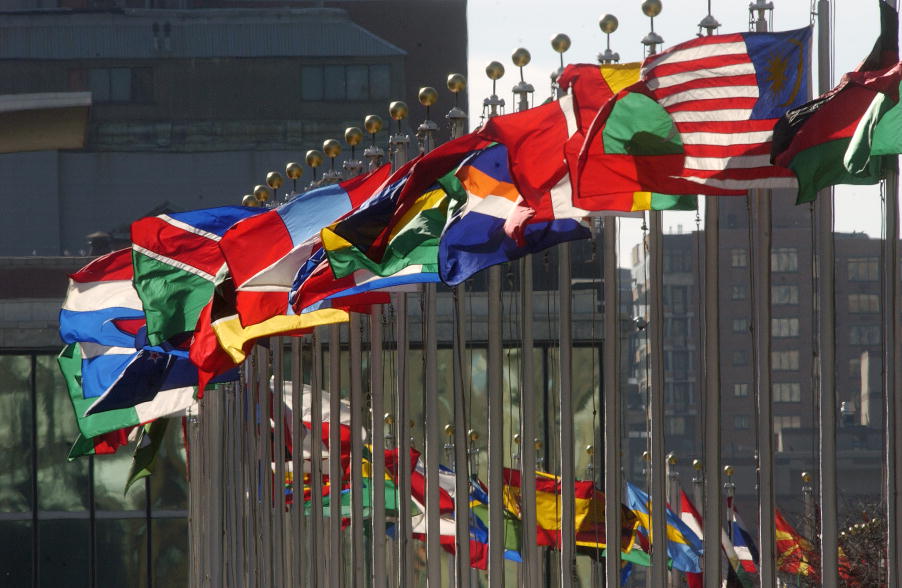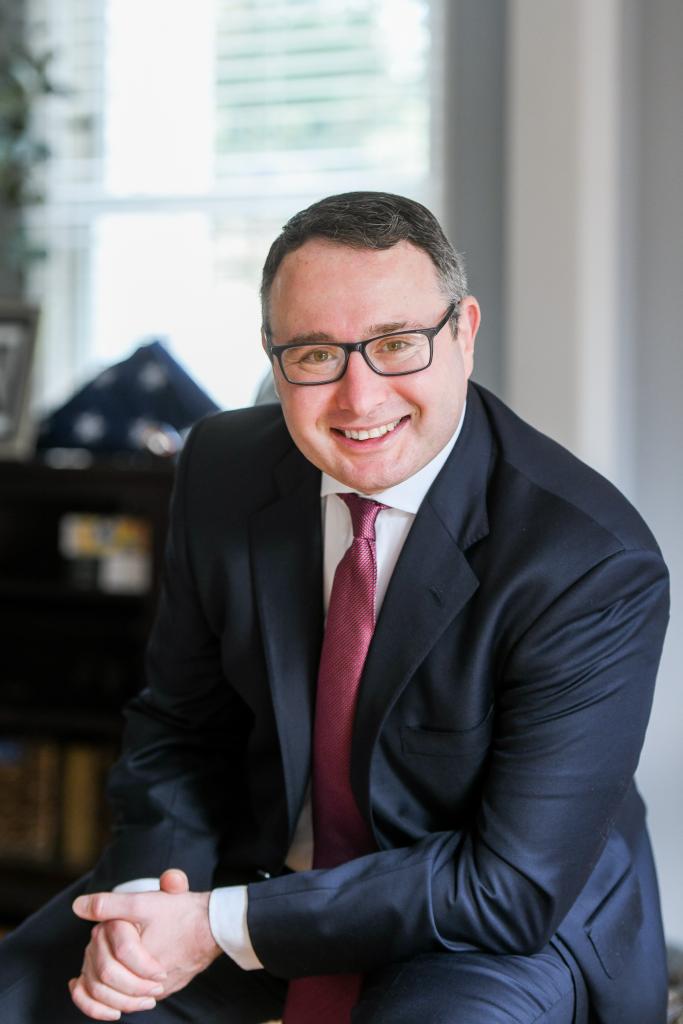Preserving Liberal Democratic Institutions Through Engagement
Openness need not empower authoritarian abuse of international institutions. Democratic leadership can contest the erosion of liberal values.

Published by The Lawfare Institute
in Cooperation With

To many in Washington, the rise of China and the revanchism of Russia herald the return of great power competition. To many more, including the United States’s allies and partners, whose proximity to Russia and China necessitate a hyperfocus on great power competition, President Biden’s announcement that “America is back” is a welcome opportunity to fend off the erosion of international norms that have ensured decades of regional stability. These allies and partners are eager to embrace a policy that reverses the Trump administration’s rejection of alliances and multilateral institutions and returns the U.S. to a leadership role protecting democratic institutions. The president’s Interim National Security Strategic Guidance makes leading “a stable and open international system” one of its topline priorities. Yet confronting authoritarian powers requires more than simply recommitting American support for the institutions and norms that make up the liberal international order.
Today’s international environment and the threats within it are drastically different from the conditions of the Cold War. Until recently, democratic policymakers and scholars generally believed that liberal international institutions such as the United Nations network, the World Trade Organization and the World Bank produce virtuous feedback loops that inherently strengthen democracies and undermine authoritarianism. But the existence of these institutions alone does not guarantee the long-term diffusion of the norms embedded in their guiding charters and mission statements. It’s true that these institutions and the norms they promulgate have done much to spread liberty, prosperity and security. Yet over time, they have failed to adapt to shifts in the global environment that have slowly started to bend the institutions toward waste, ineffectiveness, corruption and the erosion of the very democratic principles on which they were founded. Today, the adversaries of democracy are engaged in political contestation within rules-based international systems and international institutions, such as the U.N., largely in the absence of American pushback.
Authoritarians and kleptocrats have become adept at exploiting the gaps in underregulated and obscure corners of the international fora underpinning the open international system. They are able to launder corrupt proceeds through the international financial system, persecute dissidents who have fled to the safe haven of democracies using abusive Interpol red notices, and subvert open communication systems to fuel disinformation. These tactics are disparate in their execution, but together they enable authoritarian domestic rule in many countries. To compete, the Biden administration must use the centrality that the U.S. still retains within international institutions to uphold their founding liberal values and ensure that they remain effective tools to address global challenges. Beyond increasing funding and staffing for existing international institutions, the myriad challenges of authoritarianism also require creating new ones and renewing support for civil society organizations that bravely confront authoritarians in their own countries. Furthermore, a multilateral approach that leverages the strength of the U.S. alliance network will distribute the burden and increase the resources to counter the growing influence of authoritarian states on international institutions.
International Financial Institutions Enable Kleptocracy
Authoritarians everywhere, from Russia to Equatorial Guinea, abuse the international financial system with the assistance of permissive transnational networks of bankers, real estate agents, accountants, lawyers and other service providers based in major financial hubs from New York to Dubai. Consequently, public resources and the proceeds of crime are easily laundered via anonymous shell companies, real estate, and luxury goods in North America and Europe. With their stolen assets stashed in stable foreign markets beyond the reach of vengeful domestic forces, kleptocrats are free to engage in repression knowing they can always escape to their luxury homes abroad if their rule ever crumbles. The domestic supporters they co-opt with corrupt patronage opportunities are likewise able to secure their wealth abroad.
In partially democratic states, kleptocrats wield corruption as a means to gain and retain power. In recent years, scandals of grand corruption linked to U.S. and European banks have contributed to instability in Malaysia, South Africa, Ukraine, Kyrgyzstan and elsewhere. For example, the looting of about $4.5 billion from a Malaysian government investment fund would not have been possible without the services of U.S.-based Goldman Sachs, which recently agreed to a settlement of more than $2.9 billion to end a U.S. bribery probe.
In more consolidated authoritarian states, kleptocracy is the core logic ordering government. Given the inherently opaque nature of regimes, it is impossible to estimate the full extent of transnational corruption propping up authoritarian regimes. In the 2000s, bribes were necessary to move up the ranks in the Chinese bureaucracy, and corrupt proceeds dwarfed officials’ salaries. The ubiquity of corruption provided the CIA an opportunity to develop a network of high-ranking assets by paying their promotion bribes, until alarmed Chinese leaders prioritized dismantling the U.S. intelligence network in the 2010s. In Russia, oligarchs and close associates of President Vladimir Putin and the Kremlin continue to use sophisticated laundering practices to exploit weaknesses in Western institutions. The U.S. and U.K. remain a couple of the preferred destinations for billions of dollars of so-called dark money. For instance, in only one example of this trend, between 2011 and 2015, Russian clients of Deutsche Bank used “mirror trades” to launder $10 billion outside of Russia. As part of this process, Deutsche Bank brokers facilitated the simultaneous purchase (in rubles) and sale (in pounds, euros or dollars) of stocks between their Moscow, London and New York branches. Although Deutsche Bank paid $629 million to end investigations into these practices, their continued partnership with Russian clients should raise doubts about the effectiveness of regulators.
Illicit financial flows narrow the number of individuals that ruling authoritarians must co-opt. As long as oligarchs keep their stranglehold on enterprise, rank-and-file kleptocrats in the bureaucracy keep the wheels of the state greased, and the security services remain loyal, key criminal kingpins can act with impunity and most authoritarians can largely ignore dissident perspectives even when they grow in popularity. With their illicit wealth secured abroad, venal state officials turn to illiberal tactics to repress domestic opposition while they loot the state.
Authoritarians Abuse Interpol to Persecute Exiled Dissidents
The free flow of people, information and finance has helped exiled activists influence public opinion in the otherwise tightly controlled societies that they have fled. Distance, however, does not equal safety. Authoritarian regimes attempt to coerce the silence of exiled critics with harassment and surveillance, as well as threats made to family members in their home countries. When such tactics fail, governments such as Turkey, China and Russia routinely abuse Interpol’s law enforcement information-sharing tools to persecute dissidents who have fled to liberal democracies, making law enforcement in countries like the U.S. complicit in transnational repression. Although democratic judicial systems tend to reject the majority of politically motivated extradition requests, the mere issuance of illegitimate Interpol red notices (requests to provisionally detain individuals pending formal extradition proceedings) and diffusions (a similar Interpol communication that is issued for the same purpose but is sent directly by a member country or international entity to the countries of their choice) still result in arbitrary detentions and make it extremely difficult for targeted individuals to travel, open bank accounts, rent apartments and get jobs.
Examples of authoritarian abuse in the Interpol system abound. Following a failed coup attempt in 2016, the Turkish government abused Interpol red notices as part of a repressive campaign targeting members of the Gülen movement (which Turkey blames for the coup) as well as Turkish journalists and activists living abroad. In another example, in 2018, China reprimanded Meng Hongwei, a high-ranking Chinese Communist Party member chosen to serve as the president of Interpol, only six weeks after Interpol rescinded a red notice for Dolkun Isa, the president of the World Uyghur Congress. Later that year, Meng disappeared briefly during a trip to China. Shortly after Chinese officials confirmed that he was detained (ostensibly as part of President Xi Jinping’s anti-corruption campaign), Meng resigned as the president of Interpol. In 2020, he was sentenced to 13 and a half years in prison. Party discipline effectively superseded international norms. And in perhaps one of the most infamous, and still ongoing, examples of this trend, Russia has tried seven times to solicit the arrest and extradition of Bill Browder using a combination of red notice requests and diffusions. Browder, the founder and CEO of Hermitage Capital Management, has been the victim of corporate-raiding, harassment and sentencing in absentia by the Russia government since 2005, when he was deported and declared a threat to national security due to his role as an activist shareholder in Russian companies. In 2018, Russia’s abuse of the Interpol system led Spanish police to temporarily detain Browder in Madrid. Russia has employed similar methods against other dissidents.
Meanwhile, democracies continue to enable this kind of abuse. In the U.S., Immigration and Customs Enforcement (ICE) routinely acts upon red notices, despite the fact that the Justice Department does not consider them to be sufficient bases for arrests on their own. For example, Gregory Duralev was detained by ICE when he arrived for an asylum interview in Los Angeles in 2018. Duralev had sought to expose corruption in his native Russia, but he fled to the U.S. when the Russian government charged him with what he says are fabricated accusations of fraud. He was detained for 18 months due to a red notice issued by Russia that contained basic factual inconsistencies. Although the recently reintroduced Transnational Repression Accountability and Prevention (TRAP) Act could help combat the abuse of Interpol notices and diffusions in the U.S., this piece of legislation is not enough on its own to facilitate broader pushback against authoritarian conversion.
The Interpol General Secretariat that conducts day-to-day operations recognizes the problem, yet it lacks the capacity to deal with the thousands of suspect requests filed through its systems each year. Only Interpol’s General Assembly, where each of the organization’s 194 member states gets one vote, can close the gaping loopholes. While the U.S. makes comparatively little effort in this body, China, Russia and the United Arab Emirates actively whip votes against reform and to place their candidates in key decision-making bodies. One solution to the authoritarian abuse problem might be to introduce a prescreening process within the Interpol General Secretariat for red notices from authoritarian and backsliding states. But this cannot happen until the Interpol General Assembly changes the rules, which is why the U.S. needs to start whipping votes in much the same way that authoritarian states already do. Given the volume of red notices that are submitted, the secretariat does not have the staffing to successfully prescreen in the absence of rule changes that improve the process.
Authoritarians Subvert Open Communication Systems
China, Russia and other authoritarian regimes use the free flow of information as a vector to attack democracy in the U.S. and elsewhere. For instance, Russia and China have been active superspreaders of disinformation around the coronavirus pandemic. Russia has spread false information on the inefficacy of Western vaccines, while touting the effectiveness of their Sputnik V vaccine, and both Russia and China have misrepresented the comparative effectiveness of government responses to the pandemic in authoritarian and democratic states, undermined faith in existing institutions, and cast doubt over the origins of the virus. Moreover, China’s disinformation campaign has successfully suppressed reporting on China’s mishandling of the coronavirus outbreak and China’s stifling of critical information in early 2020 when a global pandemic could still have been prevented. The Chinese pressure campaign even succeeded in co-opting World Health Organization Director-General Tedros Adhanom Ghebreyesus into routinely praising Beijing for its leadership and openness for sharing information. Advances in artificial intelligence will continue to enable deepfakes and empower supercharged Russian and Chinese disinformation campaigns.
Russian bots, cyborgs and trolls pose a considerable threat to democracies around the world by creating divisive false content and amplifying disinformation that already exists on the web. Countering fake accounts is difficult for democracies, in part because the issue demands a response that encroaches on freedom of speech. This is especially true when artificial intelligence is used to combat disinformation. Algorithms that cast a wide net to identify bots spreading disinformation may also catch real people operating in echo chambers, those holding fringe views or individuals who are simply attempting to invoke satire. Such false positives can present a form of censorship, paradoxically exacerbating the problem of disinformation-fueled polarization.
China’s successful efforts to dominate the next generation of the telecommunications infrastructure that enables modern connectivity are an even more troubling reality. As part of these efforts, Huawei is bolstered by its engagement with the U.N.’s standard-setting process for emerging communications technology. With state support, technical contributions from Chinese firms to the U.N.’s International Telecommunication Union (ITU) have secured them an estimated 36 percent of the patents that make up the global 5G standard, compared with just 14 percent held by U.S. firms. While they hold a sizable chunk of the intellectual property tied to the global standard, Chinese firms also have a cost advantage in market competition that will allow China to continue to grow its 5G infrastructure dominance.
International relations scholars Henry Farrell and Abraham Newman go so far as to argue that the institutional rigidity of the liberal information order, in the context of a changing international environment and conversion by illiberal states, produces self-undermining feedback loops. Global governance of the internet escaped the grasp of traditional multilateral institutions such as the ITU in the 1990s as new technologies led to an explosion in information flows. While governance structures have drifted away from their objectives, authoritarians have learned to exploit openness into a vector of attack. In essence, without change, this issue is set to get worse before it gets better.
Contesting Authoritarian Conversion of International Norms and Institutions
Open information flows have helped citizens and civil society to organize, debate ideas, monitor elections, uncover corruption and end dictatorships—albeit with mixed results. International finance and free trade have their notable problems, but they also help facilitate development and innovation. When used for their intended purposes, Interpol tools help coordinate international law enforcement operations targeting terrorism, drug trafficking and cybercrime. The main problem is that democracies have ceded the advantage to authoritarians by failing to fully utilize their leverage in these institutions.
The relatively new recognition that norms promoted by international institutions are not guaranteed to diffuse is important, but that does not mean that they should be discarded. The Trump administration’s approach of withdrawing the U.S. from international arrangements it perceived to be ineffective or beholden to China only gave America’s adversaries more freedom to influence the rules of the international system. To counter authoritarianism, the Biden administration will need to reengage the U.S. government in the messy contestation of rules and norms within existing and new international institutions.
One recent example of authoritarians’ complete disregard for international norms was Belarus’s brazen use of a fighter jet to force a civilian flight to land in Minsk so that authorities could apprehend a leading Belarusian dissident. President Alyaksandr Lukashenka has not faced any serious consequences for brutally repressing popular protests in Belarus for months. He has also watched his fellow authoritarian leaders from Russia, China, Turkey, Saudi Arabia, Venezuela and elsewhere repeatedly get away with abusing and flouting international laws and norms in recent years. Unless leading democracies come together to adopt a new strategy to counter authoritarianism, the world can expect more shocking events like the Belarusian hijacking of the Ryanair flight and the seizure of Roman Protasevich and Sofia Sapega. The International Civil Aviation Organization is already set to convene an emergency meeting over the events in Belarus, though this likely will primarily address air travel concerns and an independent investigation into abuse in the Belarusian case. The upcoming G-7 summit represents an excellent opportunity to address the broader issues of authoritarian overreach, but it should not be the only forum for this kind of decision-making.
The U.S. also needs to contribute sufficient funds and exceptional personnel—directly and through multilateral engagement—to key international institutions such as the U.N., the World Trade Organization, the International Monetary Fund, NATO and more that undergird and advance the values of the liberal order. These institutions must be made more vigilant to the sophisticated and overlooked ways in which authoritarians take advantage of shortcomings in global governance structures. U.S. personnel can play a critical role as both advocates and functionaries to address related issues within these fora. In the absence of U.S. voices, authoritarians will continue to dominate the conversation. In relation to NATO—a decidedly more military-oriented institution as compared to the others listed above—the recent Interim National Security Strategic Guidance outlines “weaponized corruption” as a significant threat that undermines existing international rules while promoting alternative authoritarian models of governance.
“Weaponized corruption” is the use of corruption as a tool of statecraft to destabilize, co-opt or otherwise influence politics in a target country. For example, the Ukraine scandal that led to the first impeachment of President Trump is alleged to have involved specific policy objectives to aid the Kremlin-backed oligarch Dmytro Firtash in his control of gas transit through Ukraine. The polarization produced in the U.S. around the impeachment was simply a happy byproduct for the Kremlin. NATO member states can and should take this threat seriously in international institutions. Authoritarians may not be waging war on a traditional battlefield in these fora, but they are certainly attacking the liberal order by other means. Liberal democracies must further diagnose how to properly respond to weaponized corruption with a complex mix of counterintelligence, law enforcement and diplomacy. Although the policy challenge is considerable, it provides an opportunity for collective action among democratic countries.
With empowered personnel in place, the U.S. must rally representatives of fellow democracies to oppose authoritarian conversion in multiple forums including private diplomacy at the U.N. and elsewhere in coordination with high-visibility public diplomacy. One platform for this kind of diplomacy could be a Democracy Summit, where the U.S. should take a leading role in marshaling a collective response to currently unchecked authoritarian abuses of international institutions. Multilateralism will be the lifeblood of these efforts, as democracies must work together to coordinate burden-sharing, engagement stretching from high political offices to domestic civil society and the efficient distribution of resources. Disagreements will certainly arise. But rather than walking away from the negotiation table or leveling threats of disengagement—some of the previous administration’s preferred tactics—the Biden administration will need to work through the painstaking process of identifying common points of interest for a diverse coalition. These might include combating disinformation, responding to cyberattacks, fighting corruption in financial institutions, pushing Interpol reform efforts and establishing ethical principles for emerging technologies like artificial intelligence, among others. The differences within this coalition of the willing should not be barriers to cooperative solutions. They also present an opportunity for gleaning new perspectives or synthesizing approaches that have worked in disparate geopolitical contexts. Where engagement alone is insufficient, the U.S. should simultaneously put pressure on authoritarians for their transgressions. In part, this can be done by bolstering funding for civil society organizations abroad that promote free and fair elections, investigative journalism and independent judiciaries.
Serious self-reflection and domestic responses to authoritarianism will be crucial for democratic nations. The networks of corruption that authoritarian regimes mobilize cannot thrive without the complicity of state officials and private citizens in democratic countries who privilege self-interest and self-aggrandizement over democratic principles. Any pushback abroad starts with cleaning house domestically. However, there is significant variation in the implementation of law and efficacy of the judiciary in different countries. They are not always technically able to address the transnational nature of kleptocracy, and, at worst, they can be captured by corrupt actors. As such, the challenges posed by authoritarianism may warrant the creation of new international institutions such as an International Anti-Corruption Court (IACC) with the expertise and mandate to investigate and prosecute kleptocrats and their international enablers. The 187 countries that are party to the U.N. Convention Against Corruption (UNCAC) are required to have laws criminalizing bribery, fraud and other forms of corruption. Operating on the international legal principle of complementarity, an IACC would try criminal cases against kleptocrats from member states only when their national courts are either unwilling or unable to enforce their own national laws. The centrality of democratic jurisdictions in the international financial system is the Achilles heel of kleptocracy that a bold coalition of democratic leaders can seize upon by establishing an IACC. Such a court could be effective if the initial state parties that sign its underlying statute include several major financial centers, such as Switzerland and Singapore, where kleptocrats routinely launder their illicit gains. Although powerful authoritarian states will not join an IACC, such a court would still be able to try cases involving illicit assets laundered in member states. The freezing of kleptocrats’ assets does occur in some leading democracies, but such actions are uneven and can elicit accusations of geopolitics or Western imperialism. An IACC would not avoid such accusations from authoritarian propagandists, but it would nevertheless be able to rule impartially on the return and repurposing of stolen assets located in member states’ jurisdiction according to transparent and consistent standards and to the benefit of victimized publics. Successful prosecutions would promote democracy by punishing kleptocrats and creating opportunities for honest leaders, who might otherwise be constrained by dishonest domestic institutions.
To address global challenges and cope with the unknown and unintended consequences that are inherent in an open world, the U.S. and its fellow democracies need a reinvigorated multilateral approach to contestation in international fora. The art of persuasion based on ideals may be complex, but shared values are essential to strengthening the intangible bonds that make multilateralism sustainable and effective in the long term.







